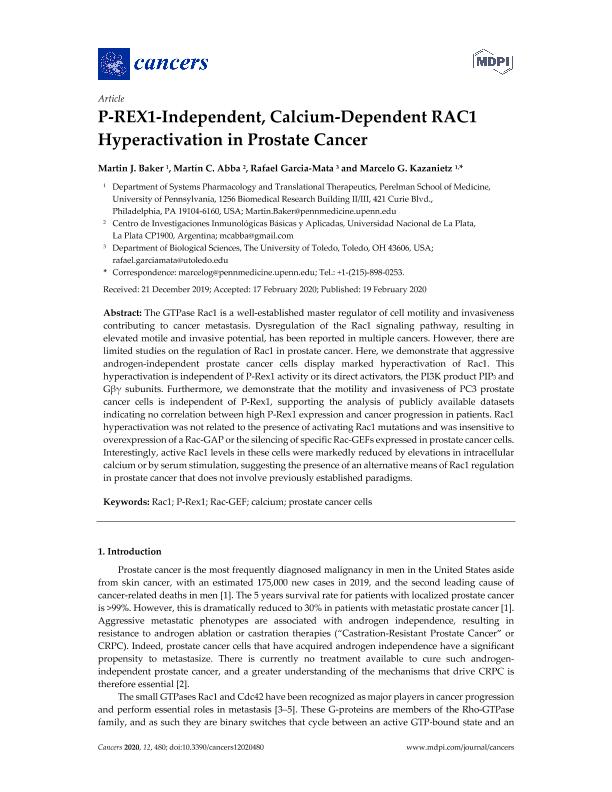Artículo
P-REX1-independent, calcium-dependent RAC1 hyperactivation in prostate cancer
Fecha de publicación:
19/02/2020
Editorial:
Multidisciplinary Digital Publishing Institute
Revista:
Cancers
e-ISSN:
2072-6694
Idioma:
Inglés
Tipo de recurso:
Artículo publicado
Clasificación temática:
Resumen
The GTPase Rac1 is a well-established master regulator of cell motility and invasiveness contributing to cancer metastasis. Dysregulation of the Rac1 signaling pathway, resulting in elevated motile and invasive potential, has been reported in multiple cancers. However, there are limited studies on the regulation of Rac1 in prostate cancer. Here, we demonstrate that aggressive androgen-independent prostate cancer cells display marked hyperactivation of Rac1. This hyperactivation is independent of P-Rex1 activity or its direct activators, the PI3K product PIP3 and Gβγ subunits. Furthermore, we demonstrate that the motility and invasiveness of PC3 prostate cancer cells is independent of P-Rex1, supporting the analysis of publicly available datasets indicating no correlation between high P-Rex1 expression and cancer progression in patients. Rac1 hyperactivation was not related to the presence of activating Rac1 mutations and was insensitive to overexpression of a Rac-GAP or the silencing of specific Rac-GEFs expressed in prostate cancer cells. Interestingly, active Rac1 levels in these cells were markedly reduced by elevations in intracellular calcium or by serum stimulation, suggesting the presence of an alternative means of Rac1 regulation in prostate cancer that does not involve previously established paradigms.
Palabras clave:
CALCIUM
,
P-REX1
,
PROSTATE CANCER CELLS
,
RAC-GEF
,
RAC1
Archivos asociados
Licencia
Identificadores
Colecciones
Articulos(CCT - LA PLATA)
Articulos de CTRO.CIENTIFICO TECNOL.CONICET - LA PLATA
Articulos de CTRO.CIENTIFICO TECNOL.CONICET - LA PLATA
Citación
Baker, Martin James; Abba, Martín Carlos; Garcia Mata, Rafael; Kazanietz, Marcelo Gabriel; P-REX1-independent, calcium-dependent RAC1 hyperactivation in prostate cancer; Multidisciplinary Digital Publishing Institute; Cancers; 12; 2; 19-2-2020; 1-18
Compartir
Altmétricas




